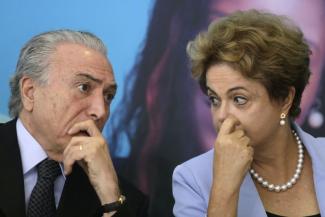Transition of power
Tough times

Brazil’s military dictatorship ended 27 years ago. Now the country is in crisis again. The political institutions are not being questioned, however, says Ricardo Sennes of Prospectiva, a consultancy. In his eyes, the capacities of political groups are being tested.
In early 2016, 17 parties were represented in the country’s Senate and 25 parties in its House of Representatives. This multitude makes it difficult to organise majorities, so any president would need considerable political skills.
Luiz Inácio Lula da Silva had those skills. The predecessor of President Dilma Rousseff, who has recently been suspended from office, forged broad-based and diverse coalitions, even getting right-wing parties to support his agenda. He could rely on about 80 % of Congress, the consultant says.
Rousseff, who belongs to the same Workers Party, was less successful. She reshuffled the cabinet to escape his influence and to divert pressure from her coalition partner, the centre-right party PMDB, says Sennes. Moreover, she changed economic policy. The result was, in Sennes eyes, that she increasingly met with opposition within her coalition.
The recession compounded problems. Inflation and unemployment have risen, and the economy is shrinking. Corruption allegations abound. Sennes speaks of a multifactoral crisis. Politicians from all parties are involved in the bribery scandal concerning the partly state-owned oil corporation Petrobras.
Before the recession, Brazil had had many good years. The share of poor people went down from 27 % in 2003 to seven percent in 2014. The number of university and college graduates tripled from 1998 to 2014. In one and a half decades, life expectancy rose by five years to more than 75. Such progress went along with considerably higher government spending, as Sennes reports in the São Paulo office of DEG (Deutsche Investitions- und Entwicklungsgesellschaft) at the end of April. DEG supports the private sector in emerging and developing countries and is active in Brazil since the 1960s.
The political crisis escalated when the PMDB stopped cooperating with the Workers Party after 13 years of coalition. It became a driving force for Rousseff’s impeachment. On 12 May the Senate confirmed the impeachment proceedings that had been started by the House of Representatives. Rousseff has thus been suspended from power for 180 days. In this time, the Senate and the Supreme Court must decide whether the charges against her are valid. She is basically accused of having fudged budget figures. Rousseff speaks of a coup. She says her opponents took advantage of the country’s bleak mood to remove her from office without elections.
Vice President Michel Temer of the PMDB is now the interim president. He is tainted by corruption, however, and may be impeached himself. Because of a campaign-finance scandal, he is barred from running in elections for eight years.
Temer has taken office, ending 13 years of leftist government by Lula and Rousseff. His cabinet consists of elderly white men. They are now running a country in which the majority is female and considers itself black or coloured. Many observers doubt the new administration will get a grip on the country’s problems.
Temer uses market-oriented rhetoric, but has also pledged to maintain social protection. His agenda includes making labour laws more flexible, reforming the pensions system and reducing social spending however. In Sennes’ view it has been obvious for many weeks that Brazil’s economic policy must change – and that enforcing such change will prove difficult.
Dagmar Wolf









